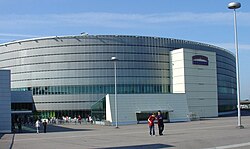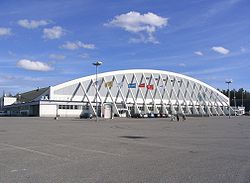 | |
| Tournament details | |
|---|---|
| Host country | |
| Venues | 3 (in 3 host cities) |
| Dates | 26 April – 11 May |
| Opened by | Tarja Halonen |
| Teams | 16 |
| Final positions | |
| Champions | |
| Runners-up | |
| Third place | |
| Fourth place | |
| Tournament statistics | |
| Games played | 56 |
| Goals scored | 349 (6.23 per game) |
| Attendance | 449,193 (8,021 per game) |
| Scoring leader | |
The 2003 IIHF World Championship was held between 26 April and 11 May 2003 in Helsinki, Tampere and Turku, Finland.
Contents
- Qualification Tournament
- Venues
- Final tournament
- First round
- Second round
- Consolation round 13–16 place
- Final round
- Ranking and statistics
- Tournament awards
- Final standings
- Scoring leaders
- Leading goaltenders
- IIHF honors and awards
- See also
- References
- External links
It was the 67th annual event, and was run by the International Ice Hockey Federation (IIHF).
Canada won the gold medal after defeating Sweden 3–2 in a tightly fought final. Over 14 minutes into the overtime, Canadian forward Anson Carter beat Swedish goaltender Mikael Tellqvist with a wraparound goal. The goal was contested for several minutes before replays confirmed that Tellqvist had stopped the puck behind the goal line. It was Canada's first World Championship win in five years.
Sweden surrendered five consecutive goals against Finland in their quarterfinal to trail 5–1 seven minutes into the second period, at which point Swedish goaltender Tommy Salo was swapped for Mikael Tellqvist. This proved to be the Swedish team's necessary wake-up call as the Swedes went on to score five unanswered goals before the end of regulation and ultimately win the game 6–5.
To celebrate the games, the Finnish government issued a high value commemorative coin: the 2003 Ice Hockey World Championships commemorative coin, with three ice hockey sticks and a puck engraved on the reverse.



